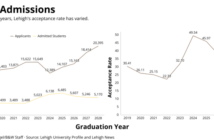At the start of every semester, Lehigh students are expected to pay more than $75,000 for attendance. Included in this cost is tuition, housing, meals, a technology fee, an activity fee and a wellness fee. It is our responsibility to ensure this bill is paid before we return to campus.
But what about the other costs that fall on students?
In addition to various fees, we are also financially responsible for our laundry, superfluous printing costs, parking passes and course textbooks. And the worst part of it all is — that’s not even the end of it.
Students are also expected to supply themselves with materials that are essential to the learning and organizing process. These items span from expensive electronics that allow us to access online work to hyper specific calculators needed to study and take exams.
It may seem unnecessary to list these final items as college expenses in a world filled with and run by electronics, but laptops, calculators and notebooks aren’t free, and most of us don’t have extra money lying around to pay for them.
Some may argue the relatively small price of the additional fees is not that bad compared to the hefty tuition students have to pay. That these extra costs are a drop in the bucket compared to the university sticker price.
But is that really the way we should determine whether or not the charges are just?
If we are already spending upwards of $75,000 a year, then why are we getting charged for things that should be included in our tuition? Doesn’t the $75K we are paying the university every semester mean that we shouldn’t have to pay another $3 every time we do laundry? Does the fact that we are Lehigh University students not allow us to have a fairly priced parking space (because we think $375 is a little steep)?
Apparently, the tuition costs only get us in the door, to then show us the list of everything else we need to buy.
This is even harder for students who rely on financial aid or loans for their tuition. Although their tuition may be reduced or temporarily covered, it is not fair for them to have to worry about putting money toward things like laundry and parking. It is also not fair to assume that all students have disposable income to spend on Lehigh’s “extra” purchases.
As a private institution, the university is acting just as it should within the logic of an open market: make the cost of the product (a Lehigh education) as high as it can possibly be before the consumer (Lehigh students) determines that the product is not worth the cost and purchases it elsewhere (another university).
This system works well enough for the university — they continue to raise the price of tuition well above the rate of inflation, and we continue to apply at record numbers. However, the student is put into an increasingly difficult position with every passing year, straining our trust and heightening our class consciousness.
We have been placed into a system where we are forced to either comply with a head-spinning number of fees associated with the school — on top of the already enormous tuition — or drop out en masse to show the school they have pushed too far.
Clearly, the latter option will never happen, and clearly, the power dynamic is and will be swayed significantly in Lehigh’s favor. They know this.
Where is the limit, exactly? If the university announced tomorrow that laundry costs were doubled and meal plans only covered half of what they originally did, what would you do?
Would you complain and protest and write compelling editorials decrying the change as nothing more than corporate greed? That may make some noise, but it won’t change any administrators’ minds.
Would you and all your friends transfer to Lafayette to show the university they went too far this time? Probably not.
So now that you understand just how powerless you are, what are you going to do about it? What can you do about it?
This is a good question — one that we can’t answer for you here. We’ve done our part by passing this message along. It’s just unclear whether or not anyone is listening or what they will do with this when they read it.






Comment policy
Comments posted to The Brown and White website are reviewed by a moderator before being approved. Incendiary speech or harassing language, including comments targeted at individuals, may be deemed unacceptable and not published. Spam and other soliciting will also be declined.
The Brown and White also reserves the right to not publish entirely anonymous comments.
1 Comment
To the editorial board….I feel your pain. The thing is that you are focusing upon the wrong item(s) as opposed to the root problem. The associated fees you reference are “chump change” when compared to overall tuition. While you note the rapid rise in tuition and question what you get for $75K a year doesn’t really address your (your parents) problem. The real questions to be answered are what are you paying for and is it worth it? To put things in perspective – back in the Dark Ages my max tuition was $7,500/year – all in. Graduate school was a paltry (?) $25K…but what has changed in education since this time? In a word nothing. Is the information being imparted significantly different than say 10/20/30+ years ago? In the humanities and business schools (some areas yes but generally, not really) but in engineering and sciences – changing all of the time. What LU and other colleges have engaged in is “SKU creep”. Meaning they have added new classes and degrees to attract students without thinking (caring?) how it impacts its cost structure or if the degrees are market worthy. In doing so the number and layers of teachers, TAs, administrators, and buildings rise – bloating the cost structure. To cover the “increasing nut” the school raises tuition. To make matters worse, the government provides cheap loans that help to fuel the tuition inflation. The end result is tuition at $75K/year and a “boat load” of debt upon graduation. Try paying this debt with a degree in “creative basket weaving”. So where does this all lead? At some point people will say “enough” and look to alternative venues/schools to become educated. I realize that LU provides a great degree and I’m thankful for my education, BUT at some point even LU will price itself out of the market. My suggestion is that the LU community pare down the operation to its core areas of excellence and focus/expand upon these areas. Of course engineering will be big but so will business and some facets of liberal arts. With regards to liberal arts – I am not trying to be harsh but sticking to the classics has historically proven to be the most rewarding/beneficial. Within each of the schools only the most relevant degrees should be offered. Not an easy task but will result in a stronger product offering, higher demand, and more reasonable tuitions. “Kindof” a long way to address fees….no? OK time to get off of my soapbox. Really good column and I wish you continued success at LU. Pax